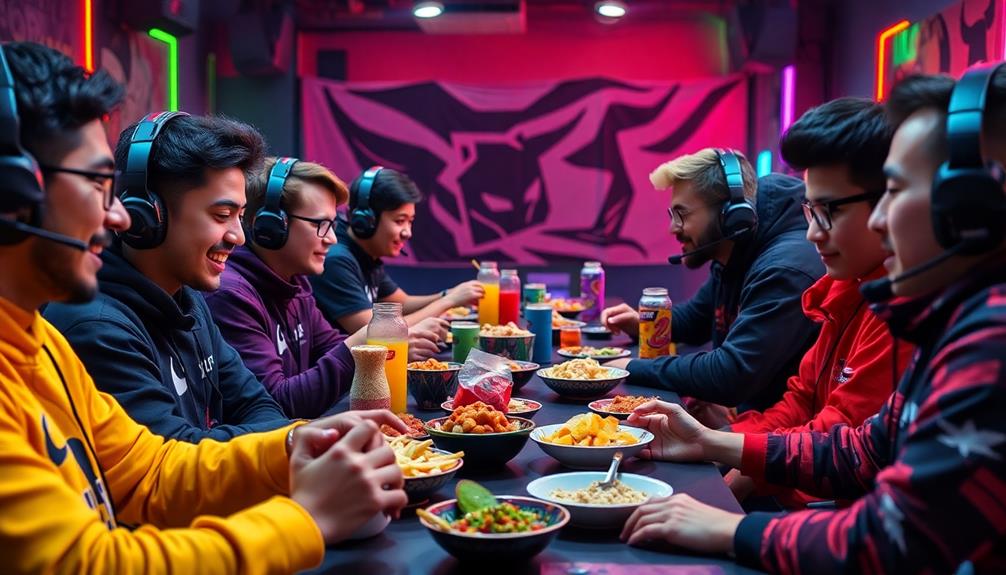Virtual cooking classes are reshaping culinary education by making it accessible and engaging right from your kitchen. You can join expert chefs from around the world, learn about diverse cuisines, and even bond with your family over cooking. With flexible schedules, you can fit classes into your busy life, while interactive experiences offer real-time feedback to sharpen your skills. Plus, these virtual sessions promote sustainable practices and healthy eating. As this trend grows, you'll discover new ways to enhance your culinary journey and connect with a community of fellow enthusiasts keen to share their passion.
Key Takeaways
- Virtual cooking classes emerged during the pandemic, offering flexible and engaging culinary education to diverse learners across various locations.
- Interactive experiences provide real-time feedback from chefs, enhancing skills and fostering collaboration among family members participating in cooking together.
- Technology facilitates global connections, exposing learners to diverse cuisines and culinary traditions, enriching their culinary education and appreciation for global flavors.
- Community building thrives through shared experiences and social media interactions, encouraging peer-to-peer learning and support among culinary students.
- The future of culinary education embraces a hybrid model, combining online and traditional methods while incorporating technology for immersive learning experiences.
Rise of Virtual Cooking Classes
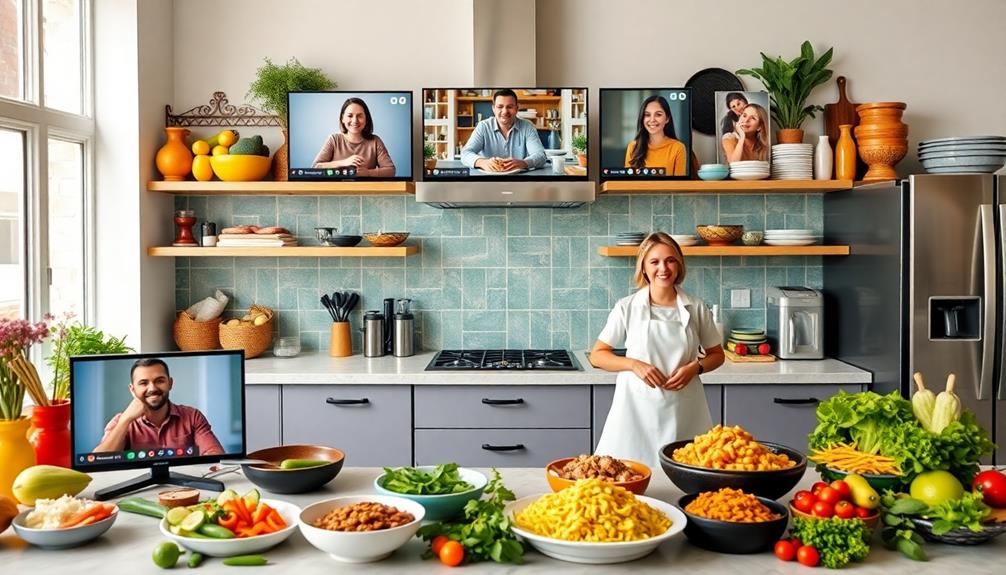
The rise of virtual cooking classes has transformed the culinary landscape, especially during the Covid-19 pandemic. As culinary schools and organizations pivoted to online formats, you likely noticed how accessible cooking education became.
LIFT Enrichment, for instance, shifted to virtual cooking classes, engaging over 2,000 kids weekly before the pandemic and maintaining high participation rates as classes quickly sold out. These classes have even introduced participants to nutritious seasonal dishes like Nettle and Potato Soup and Grilled Peach and Burrata Salad, showcasing the importance of farm-to-table cooking.
These virtual cooking classes have gained popularity among families, allowing you and your children to bond while preparing meals together. Imagine cooking healthy recipes like Veggie Quesadillas and Crunchy Ground Turkey Tacos, all from the comfort of your kitchen.
This approach not only promotes culinary skills but also fosters meaningful family interactions through shared experiences.
The success of these online classes has prompted plans for ongoing integration of virtual cooking classes in culinary education. You can expect a more accessible and engaging learning environment tailored to diverse learners, ensuring that everyone has the opportunity to explore their culinary interests.
With this shift, the culinary world is adapting to meet your needs, and the future of cooking education looks brighter than ever.
Benefits of Online Culinary Education
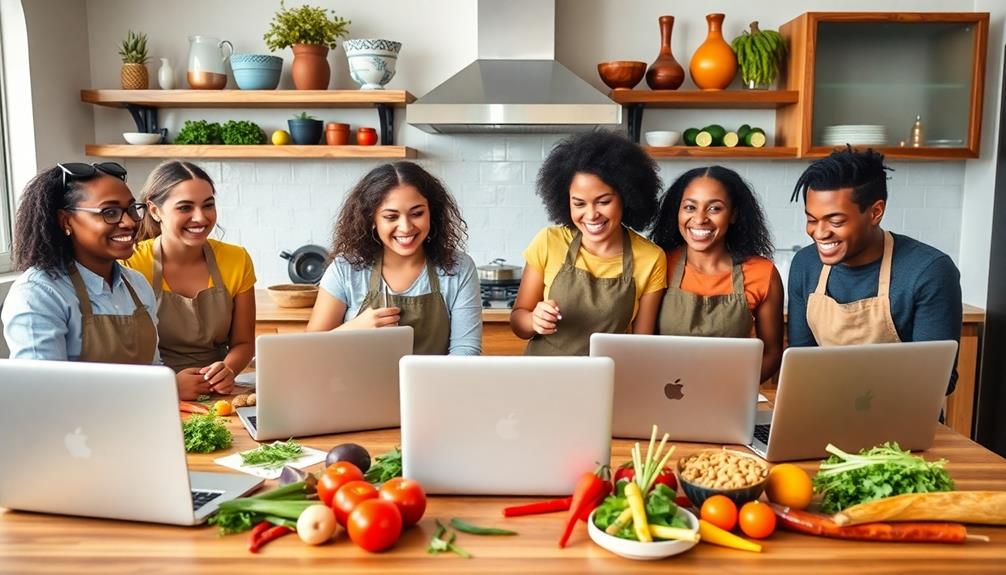
Online culinary education offers numerous advantages that make it an appealing choice for aspiring chefs and home cooks alike. With the rise of virtual kitchens, you can learn culinary skills from the comfort of your home, no matter your schedule. This flexibility increases accessibility and opens doors for many who mightn't have considered traditional culinary schools.
Additionally, exploring diverse cuisines, such as the vibrant flavors of Brazilian cuisine, can enhance your culinary experience and inspire creativity in your cooking.
Here are a few key benefits of online culinary education:
- Flexible Learning: Participate in classes from anywhere, accommodating your busy lifestyle.
- Interactive Experiences: Engage in real-time feedback with chefs, enhancing your skills and confidence.
- Cultural Exploration: Experience global cuisines through virtual tours, broadening your culinary repertoire.
Additionally, the availability of tailored recipes and ingredient substitutions allows for a personalized learning experience. This means you can experiment with different dishes and adapt them to your taste.
The demand for online culinary education is evident, especially with programs like virtual summer camps filling up quickly. By taking advantage of these innovative learning methods, you can elevate your culinary journey and discover new passions in the kitchen.
Engaging Families Through Cooking
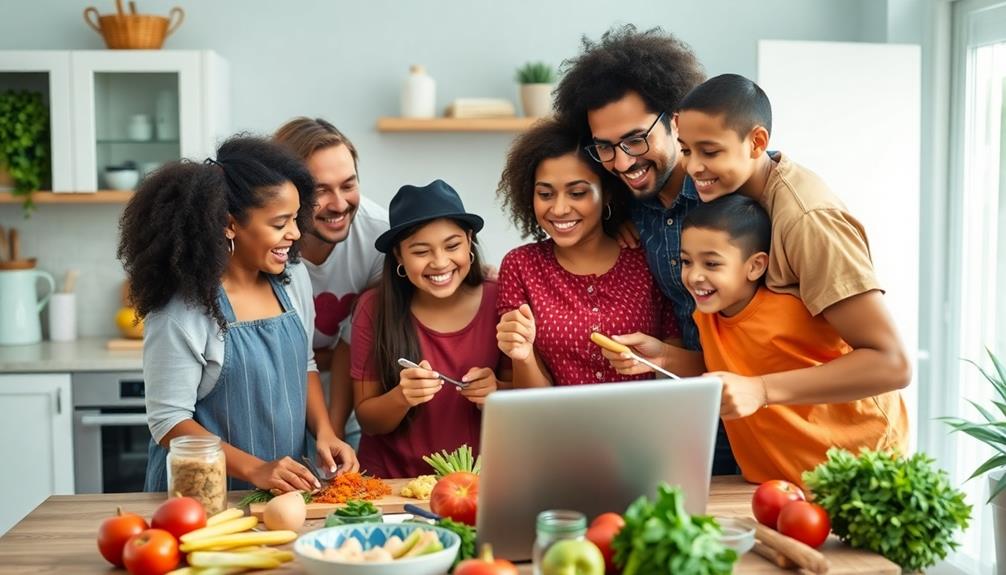
Cooking together can create a sense of unity and shared experience among family members. Virtual cooking classes have transformed the way you and your loved ones can bond in the kitchen.
These online culinary arts sessions allow kids to actively participate alongside parents, fostering collaboration and teamwork. As you cook, you're not just following recipes; you're engaging in discussions about food origins and essential culinary skills, enriching the experience for everyone involved.
For instance, exploring dishes like Mushroom Masala can introduce families to a rich blend of spices that enhances earthy flavors, making for an exciting cooking adventure.
In these interactive classes, healthy recipes like Veggie Quesadillas and Crunchy Ground Turkey Tacos are featured, providing you with the tools to prepare nutritious meals while learning valuable techniques.
Parents have found that their children enjoy cooking, which contributes to skill development and healthy eating habits.
The positive feedback from families highlights the ease of following along with the recipes and the satisfaction that comes from creating meals together.
The high demand for these virtual cooking classes, evident in their quick sell-out rates, showcases how enthusiastic families are to explore culinary education together.
Engaging in these sessions not only enhances skills but also strengthens family bonds, making cooking a joyful and educational experience.
Technology's Role in Culinary Learning
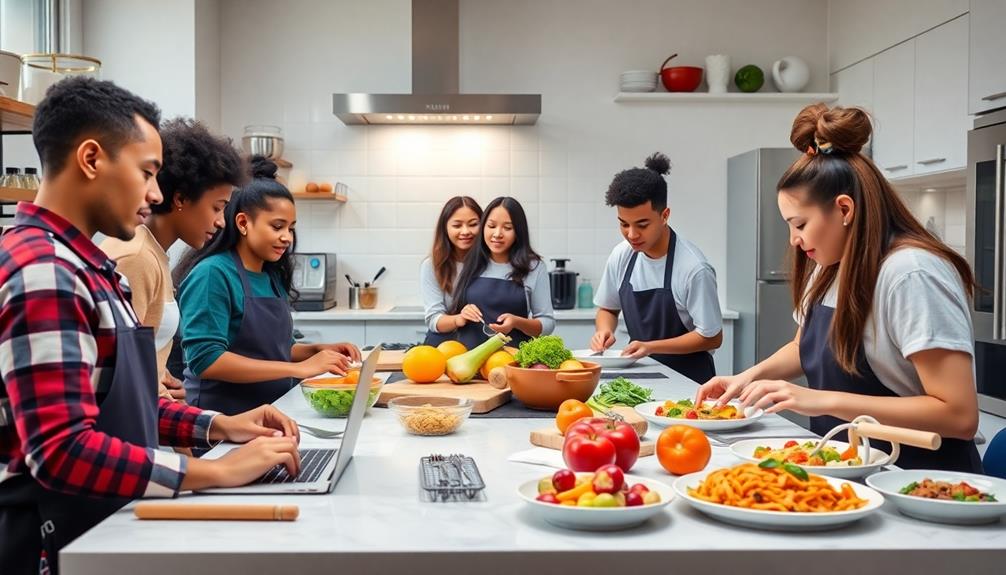
Technology transforms your culinary learning experience by making it interactive and engaging.
With real-time expert guidance, you can sharpen your skills while connecting with fellow food enthusiasts worldwide.
This digital landscape opens up a world of possibilities for cooking and collaboration right from your kitchen.
Interactive Learning Experiences
In today's culinary landscape, virtual platforms offer an innovative way to engage with food, making learning more interactive and accessible than ever before.
With the rise of digital cooking classes, you can immerse yourself in culinary education that emphasizes hands-on practice right from your kitchen.
These interactive learning experiences revolutionize how you develop essential cooking skills.
You'll find that:
- Hands-on practice: Simulate kitchen tasks like chopping and plating, enhancing your technique in a safe environment.
- Personalized learning: Tailor your classes to suit your preferences and dietary needs, allowing for a more customized educational journey.
- Community engagement: Participate in discussions about food origins and culinary skills, fostering a sense of belonging among fellow learners.
These elements combine to create a dynamic atmosphere where you not only learn but also connect with others who share your passion for cooking.
The technology behind virtual classes guarantees that culinary education is no longer confined to traditional kitchens, making it easier for you to explore and grow your culinary skills at your own pace.
Real-Time Expert Guidance
Virtual cooking classes bring real-time expert guidance right into your home, transforming your culinary learning experience. With the help of video conferencing platforms, instructors can demonstrate techniques while interacting directly with culinary students. This immediate connection allows you to ask questions and receive feedback, guaranteeing you grasp essential skills as you cook along.
Additionally, tools like augmented reality can elevate this experience by overlaying visual instructions and tips, helping you stay on track during cooking sessions. When you make mistakes, real-time feedback from expert chefs enables you to correct them instantly, fostering both skill development and confidence in your abilities.
The seamless integration of apps and online platforms also simplifies access to recipes, ingredient lists, and instructional videos. This convenience makes it easier for culinary students to follow along with expert guidance and fully engage in the learning process.
As more families seek educational and interactive cooking experiences, the popularity of virtual cooking classes continues to rise, with many sessions quickly selling out. By leveraging technology, these classes guarantee that you receive exceptional guidance right from your kitchen.
Global Culinary Connections
Connecting with expert chefs from around the globe enriches your culinary education and broadens your palate. Virtual cooking classes leverage technology to create immersive learning experiences that expose you to diverse international cuisines. You gain not only cooking skills but also cultural understanding that enhances your culinary journey.
Through these online platforms, you can enjoy:
- Interactive virtual tours that showcase traditional dishes and cooking techniques from various cultures.
- Real-time feedback from chefs, fostering a collaborative environment where you can share your experiences with peers worldwide.
- Networking opportunities with aspiring chefs and culinary professionals, establishing lasting connections that extend beyond the kitchen.
The integration of digital tools in culinary education emphasizes sustainable food practices and sourcing ingredients responsibly. As you interact with chefs and fellow students, you'll develop a global perspective on food and its environmental implications.
These shared learning experiences not only improve your culinary skills but also enhance your appreciation for the world's rich culinary heritage. Embrace this opportunity to connect, learn, and grow as a chef in a global community.
Challenges in Virtual Cooking Instruction
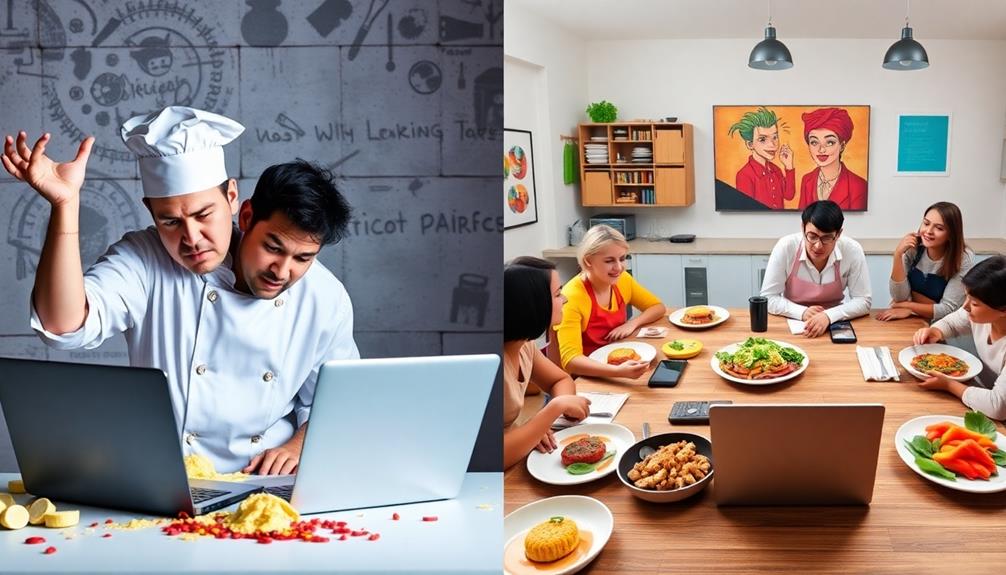
Teaching cooking online presents unique challenges that can hinder effective learning. One major hurdle is replicating the sensory experiences of taste and smell, which are vital for grasping culinary techniques. Without these sensory cues, you might find it tough to fully engage with the material.
Additionally, technology platforms like Zoom and Google Meet can limit interactive engagement, making it harder to create an inclusive and dynamic classroom environment. Culinary skills requiring hands-on practice, such as knife skills and plating techniques, become particularly challenging in this format.
You may notice that students have varied experiences with online instruction; self-motivated individuals often thrive, while others struggle to adapt. This disparity highlights the need for additional training for instructors, as they must optimize online teaching strategies and cater to diverse learning styles.
Lastly, as you explore sustainable practices in the kitchen, the shift to virtual classes could lead to innovative ways of incorporating these principles. However, overcoming these challenges is essential for a successful culinary education experience in the digital domain.
Future of Culinary Education
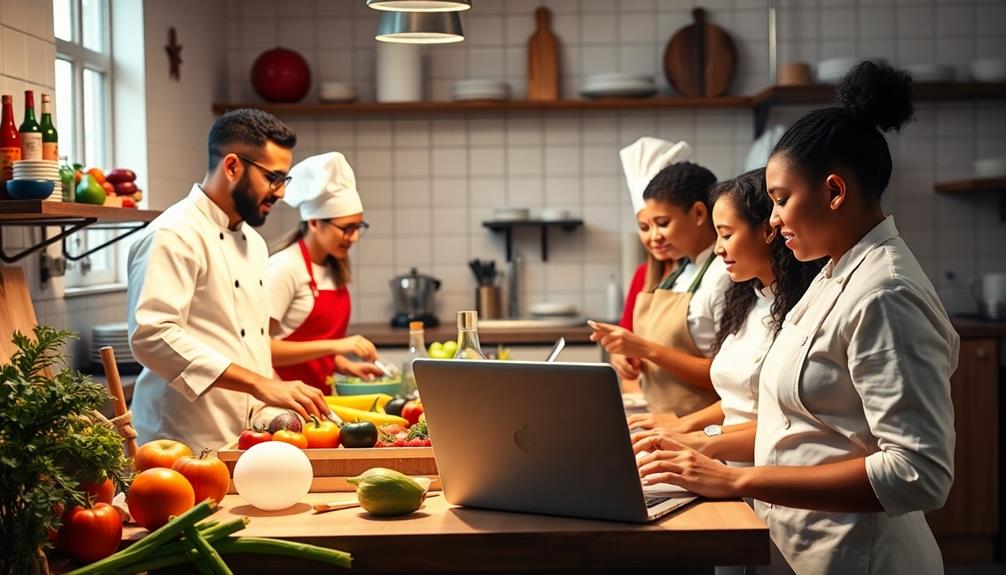
As culinary education evolves, the future promises a dynamic blend of traditional and online learning methods. This hybrid model enhances flexibility and accessibility, making it easier for you to engage with culinary skills at your own pace.
With the rise of virtual cooking classes, you'll find opportunities that cater to diverse skill levels and foster unique interactions through innovative platforms.
Expect to see a culinary curriculum that embraces various themes and techniques, ensuring it stays relevant to industry trends and your interests. Key aspects of this future include:
- Incorporation of technology: Virtual kitchens and augmented reality will reshape culinary practices, creating immersive learning experiences.
- Focus on health: There's a growing commitment to healthy eating, with culinary education increasingly involving children in meal preparation.
- Interactive platforms: These will facilitate engagement, collaboration, and peer learning, essential for honing your skills.
As these elements come together, culinary education won't only teach you how to cook but also equip you with the knowledge required for a successful career in the evolving food landscape.
Community Building in Online Classes
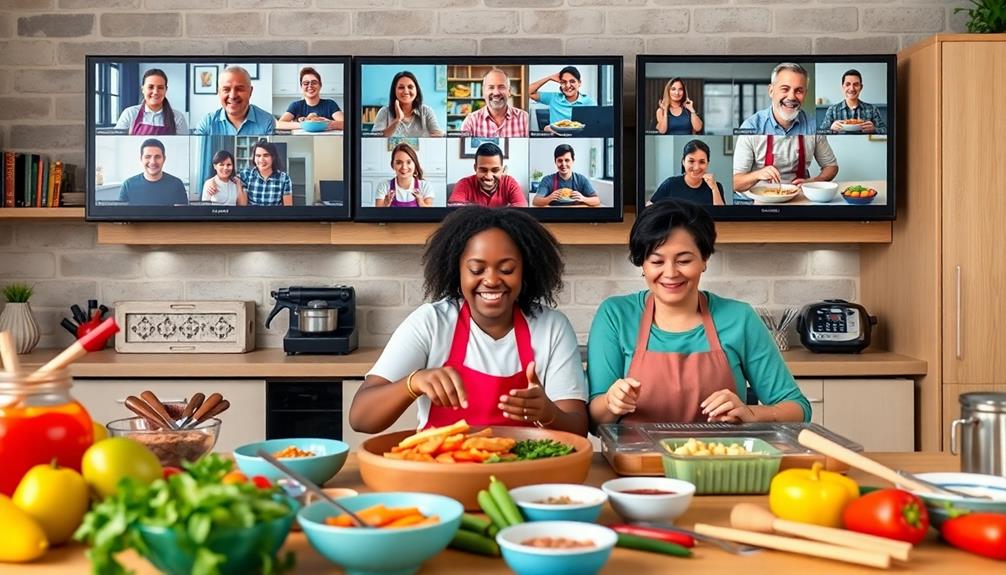
In the world of online cooking classes, community building thrives through shared experiences and interactions among participants. You connect with fellow cooking enthusiasts from diverse geographical locations, collaborating on culinary projects and sharing your unique experiences.
This sense of community is enhanced by forums and social media groups found on many virtual cooking platforms, where you can engage with others, exchange recipes, and discuss various cooking techniques.
The interactive nature of online classes encourages peer-to-peer learning. You'll find that participants often support each other in skill development and culinary exploration, fostering a collaborative environment.
Networking opportunities abound, allowing you to form connections with professional chefs and like-minded individuals. These relationships can lead to future collaborations and mentorship.
Moreover, group cooking sessions create a shared experience for families, strengthening bonds through joint culinary activities and learning. Whether you're cooking alongside relatives or meeting new friends online, community building in these classes enriches the culinary education experience.
Ultimately, it transforms cooking from a solitary task into a vibrant journey shared with others, making your culinary adventures even more enjoyable.
Frequently Asked Questions
What Are the Benefits of Online Cooking Classes?
Online cooking classes offer you flexibility, convenience, and access to professional chefs. You can bond with family while learning diverse techniques, enhancing your skills in an engaging environment that encourages interaction and deepens your culinary knowledge.
How Does Culinary School Work Online?
Imagine whipping up a gourmet dish from your kitchen. In online culinary school, you're engaging with interactive content, attending live lectures, and practicing hands-on skills, all while receiving instant feedback from seasoned chefs. It's culinary magic!
Should Cooking Classes Be Added to the School Curriculum?
You should definitely advocate for cooking classes in schools. They enhance nutritional awareness, foster essential life skills, and boost student engagement. Plus, they introduce diverse cuisines, making learning both fun and culturally enriching for everyone involved.
How Could Students Benefit From Taking a Culinary Arts or Cooking Class?
Imagine mastering the art of boiling water—exciting, right? Taking culinary classes, you'll gain essential skills, boost your confidence, explore creativity, learn healthy habits, and guarantee your kitchen doesn't resemble a food safety horror story.
Conclusion
Virtual cooking classes are like a bubbling pot of creativity, bringing together flavors and techniques from around the world. Just as a chef adapts recipes to suit their taste, you can customize your culinary journey online. With more than 60% of people reporting improved cooking skills through these classes, you're not just learning; you're building a community. Embrace the shift in culinary education, and stir up your passion for cooking in the comfort of your own kitchen!



